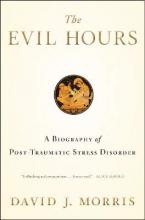“The Evil Hours: A Biography of Post-Traumatic Stress Disorder” is a marvelous, complex, dark, and gritty book. Well written by David J. Morris, a Marine turned journalist, it examines both old and new ways of understanding the psychological consequences of war.
As a retired Army psychiatrist, I am well familiar with the history and realities of posttraumatic stress disorder (PTSD). But Mr. Morris recounts them in a new way that is complemented by his personal experiences of being a patient in the maw of the Veterans Affairs system.
The history of psychological reactions to war, from Homer to the present day, is well known to most military mental health practitioners, but less so to the civilian world. Dr. J.M. DaCosta’s term “irritable heart,” from the Civil War, and the term “shell shock” from World War I, are staples of military psychiatry.
Mr. Morris amplifies that discussion. He ascribes the violence in the West following the Civil War to the wandering of battle-scarred soldiers. Jesse James and other outlaws were former Confederates.
The trench warfare–induced torments of soldiers during and after World War I are known through the writings of poets such as Wilfred Owen. His words resonated with Vietnam veterans a half-century later.
David Morris also articulates well the difficulties with reintegration of the warriors back into the home front. His historical review highlights how other warriors who had killed had rituals and cleansing processes as they reunited with their communities. The absence of such rituals may exacerbate the rough transition many of our recent soldiers have struggled with.
The related concept of moral injury is well described, with references to the writings of psychiatrists Jonathan Shay and Bill Nash, and psychologist Brett Litz. I think of moral injury as the corrosive sense of shame and guilt caused by killing, by surviving when one’s buddies have not, or of feeling betrayed by the military that you have devoted yourself to.
What I found much more fascinating, however, was his first-hand description of trying to be a patient at the VA, treated with the so-called evidence-based therapies, such as prolonged exposure (PE) and cognitive processing therapy.
Mr. Morris found that PE made his symptoms much worse and writes: “I began to think of the treatment not as therapy so much as punishment. Penance.”
This is consistent with my experience: I served on an Institute of Medicine committee that sought to evaluate how well the Department of Defense and the VA delivered care to those with PTSD. We found that service members often hated those so-called evidence therapies. Their reluctance was tied to many reasons, including not wanting to talk to a therapist about and relive the traumas over and over.
When Mr. Morris finally ended PE, he wrote that he began to feel better “almost immediately.” “The anxiety I had felt, knowing that I would be forced to mindlessly relive the ambush at Saydia, dissipated in an almost mathematical fashion,” he wrote.
There is much more to savor in “The Evil Hours,” from reflections on cognitive processing therapies, use of medications, to alternative therapies, and posttraumatic growth. The Marine-turned-journalist, functioning as both a patient and recorder of the patient role, holds up an excellent mirror to our psychiatric practice.
Dr. Ritchie serves as professor of psychiatry at the Uniformed Services University of the Health Sciences in Bethesda, Md., and at Georgetown University in Washington.



